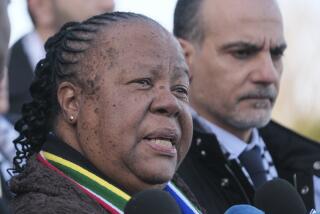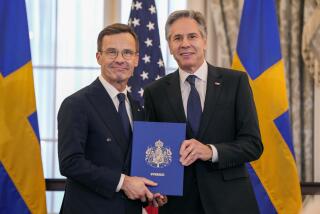S. Africa to Sign Nuclear Non-Proliferation Treaty : Weapons: The decision is a result of the reduced threat of military conflict in the region and a desire for closer ties abroad, Pretoria says.
- Share via
JOHANNESBURG, South Africa — The South African government, saying it is seeking to take its “rightful place in the world community,” announced plans Thursday to sign the international nuclear non-proliferation treaty, ending years of suspicion about its weapons capability.
The pledge to open its nuclear facilities to inspection and not to divert nuclear material for weapons “will allay any fears South Africa will ever use such devices,” Foreign Minister Roelof F. (Pik) Botha told a news conference in Pretoria.
“This is our way of contributing to the creation of a nuclear weapons-free zone in southern Africa,” the foreign minister added.
President Frederik W. de Klerk, in a statement, said his Cabinet’s decision to sign the 1970 Treaty on Non-Proliferation of Nuclear Weapons was a result of the reduced threat of military conflict in southern Africa and a desire for closer ties with other nations.
“The Cold War has subsided,” De Klerk said. “The last Cuban troops have withdrawn from Angola. . . . The threat of a conventional military conflict in the southern African region involving superpower rivalry has diminished substantially.”
Botha said South Africa has two or three nuclear facilities and “certainly has developed the capacity to produce a nuclear weapon.” But he declined to say whether the country had ever made a nuclear weapon.
For years, South Africa had refused to sign the treaty, adding to speculation that it had produced, or intended to produce, such a weapon. But Botha said Pretoria’s reluctance was a result of its isolation.
“There was an arms embargo against us,” he said. “For years we lived . . . with a threat of a conventional war. There was a potential deterrent inherent in (having) the capacity to produce a nuclear explosive device in those circumstances. That in itself has passed.”
The timing of South Africa’s announcement seemed designed to help remove yet another obstacle to the lifting of sanctions against this country. With the removal of some of South Africa’s most notorious apartheid laws this month, many countries have begun moves toward removing the sanctions.
De Klerk said the decision to sign the treaty, taken at a Cabinet meeting Wednesday, will help South Africa’s “advanced nuclear technology base and nuclear industry” by allowing it to openly exchange information and technology with other countries.
The non-proliferation treaty bars non-nuclear member nations from acquiring nuclear weapons and commits its 141 signatories to open their nuclear facilities to periodic inspection. In return, the United States, Soviet Union and Britain, which have acknowledged production of nuclear weapons, pledge to work toward disarmament and provide peaceful nuclear technology to treaty members.
The United States and the Soviet Union have armed opposing sides in several regional conflicts in southern Africa. A 1988 U.S.-brokered peace agreement recently ended the fighting in Angola, where Soviet-backed Cuban troops had been supporting the government against U.S.- and South African-backed rebels. Cuban troops now have withdrawn.
More to Read
Sign up for Essential California
The most important California stories and recommendations in your inbox every morning.
You may occasionally receive promotional content from the Los Angeles Times.














